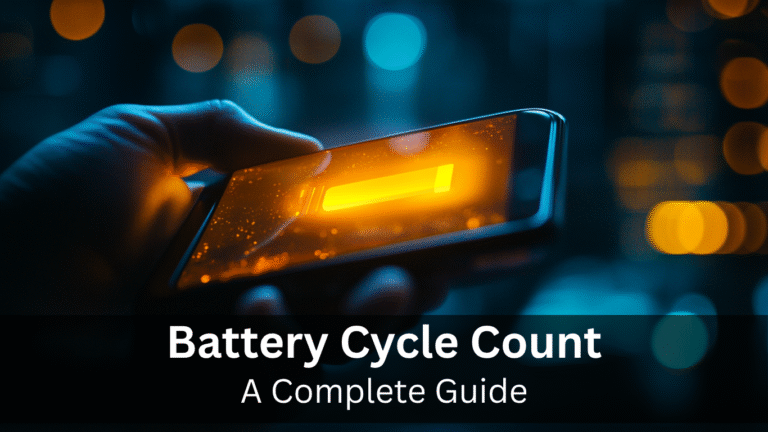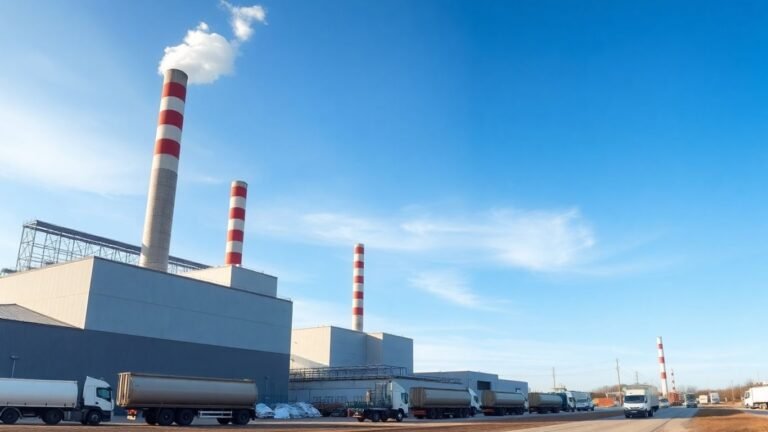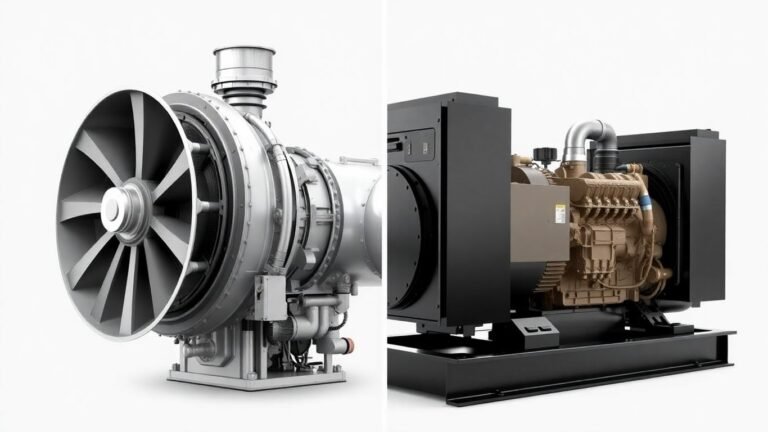The Best Propane Generators of 2025: Performance, Features, and Value
If you’re a homeowner looking for a reliable power source, a propane generator could be just what you need. These generators are becoming increasingly popular due to their efficiency and versatility. In this guide, we’ll break down how these generators work, the different types available, their benefits, and what you need to consider when choosing one for your home. Whether you’re preparing for emergencies or just want a backup power source, understanding propane generators is essential.
Key Takeaways for Propane Generators
- Propane generators operate by burning propane to produce electricity, making them efficient and reliable.
- There are various types of propane generators, including portable, standby, and inverter models, each suited for different needs.
- Choosing a propane generator can be cost-effective due to lower fuel costs and reduced maintenance compared to other fuel types.
- Proper installation and adherence to safety regulations are crucial for the safe operation of propane generators.
- Routine maintenance is key to keeping your propane generator running smoothly and extending its lifespan.

Understanding How Propane Generators Work
The Combustion Process
Propane generators, much like the engines in our cars, rely on internal combustion to generate electricity. The process starts when propane, typically sourced from a tank, is fed into the generator’s engine. Inside the engine, the propane mixes with air, and this mixture is then compressed. The compressed mixture is ignited, causing a rapid expansion of gases that drives a piston. This piston movement is what ultimately gets converted into electrical energy. It’s a pretty neat and reliable way to keep the lights on when the power grid decides to take a break.
Power Generation Mechanism
So, how does that piston movement turn into usable electricity? Well, the piston is connected to a crankshaft, which rotates as the piston moves. This rotation then spins a generator, also known as an alternator. The alternator uses the principle of electromagnetic induction to convert mechanical energy into electrical energy. Basically, it has coils of wire that spin within a magnetic field, and this movement induces an electric current. This current is then regulated and sent out to power your appliances. It’s a bit like a mini power plant right in your backyard, providing backup electricity when you need it most.
Fuel Supply and Storage
One of the things that sets propane generators apart is their fuel source. Propane is typically stored in tanks, which can range in size from portable cylinders to large, permanent tanks. The size of the tank you need depends on how much power you anticipate needing and for how long.
A larger tank means longer run times, but it also requires more space. Propane is a relatively clean-burning fuel, and it has a long shelf life, which is a big plus for emergency preparedness. Unlike gasoline, propane doesn’t degrade as quickly, so you can store it for extended periods without worrying about it going bad. Plus, propane is easy to source; exchanging the empty tank for a full one is easy.
Having a reliable fuel supply is key to ensuring your generator can keep running during an outage. Consider your storage options carefully and make sure you have a plan for refilling or replacing your propane tanks as needed. This will help you avoid any unexpected interruptions in power supply.
Here’s a quick look at typical propane tank sizes and their approximate run times:
| Tank Size (lbs) | Capacity (Gallons) | Approximate Run Time (hours at 50% load) |
|---|---|---|
| 20 | 4.7 | 6-12 |
| 100 | 23.6 | 30-60 |
| 500 | 119 | 150-300 |
Exploring Different Types of Propane Generators

Portable Propane Generators
These are your go-to for camping, tailgating, or small backup power needs. They’re designed to be moved easily, and you can usually find them at your local hardware store. They connect to standard propane tanks, like the ones you use for your grill. The portability makes them super convenient, but they generally have lower power output compared to other types. Think of them as the compact SUVs of the generator world – versatile but not the most powerful.
Standby Propane Generators
Standby generators are a whole different ballgame. These are the big boys, designed for whole-house backup power. They’re permanently installed and connected to your home’s electrical system and a larger propane tank. When the power goes out, they kick on automatically. It’s like having a personal power plant ready to go. They offer a seamless transition during outages, keeping your lights on, fridge running, and your family comfortable. They are a significant investment, but the peace of mind they provide is worth it for many homeowners. You can compare them to diesel generators for industrial use.
Inverter Propane Generators
Inverter generators are the tech-savvy cousins of the generator family. They produce cleaner power than traditional generators, making them ideal for sensitive electronics like laptops and smartphones. They’re also generally quieter and more fuel-efficient. The way they work is a bit different; they produce AC power, then convert it to DC, and then back to AC. This process results in a more stable and consistent power output. They’re a bit pricier, but if you value quiet operation and clean power, they’re worth considering.
Choosing the right type of propane generator really depends on your specific needs and budget. Think about how much power you need, how often you’ll use it, and where you’ll be using it. This will help you narrow down your options and find the perfect generator for your situation.
Evaluating the Advantages of Propane Generators

Propane generators are becoming increasingly popular, and for good reason. They offer a range of benefits that make them a smart choice for homeowners looking for reliable backup power. Let’s explore some of the key advantages.
Environmental Benefits
One of the biggest draws of propane generators is their environmental impact. Propane burns cleaner than gasoline or diesel, producing significantly fewer greenhouse gas emissions. This makes it a more sustainable option for those looking to reduce their carbon footprint. It’s a practical way to have backup power while being mindful of the environment.
Cost-Effectiveness
While the initial investment in a propane generator might seem comparable to other types, the long-term cost-effectiveness can be a major advantage. Propane itself is often cheaper than gasoline or diesel, and propane generators typically require less maintenance. This can lead to significant savings over the lifespan of the generator. Plus, you avoid the hassle of fuel stabilization, which is often needed with gasoline.
Long Shelf Life
Unlike gasoline, which can degrade and become unusable over time, propane has a very long shelf life. In fact, under the right conditions, propane can be stored indefinitely without any significant degradation. This makes it an ideal fuel for emergency situations, as you can store a large supply without worrying about it going bad. This is a huge advantage over gasoline, which requires additives and careful storage to prevent it from deteriorating. This makes propane generators a hassle-free choice.
Having a reliable source of power during an outage is invaluable. Propane’s long shelf life and cleaner burning properties make it a top contender for homeowners seeking peace of mind and a reduced environmental impact.

Sizing Your Propane Generator for Home Use
Choosing the right size propane generator is essential for ensuring your home can weather power outages without a hitch. Too small, and you’ll be left in the dark. Too big, and you’re wasting money on unnecessary capacity. It’s a balancing act, but with a little planning, you can find the perfect fit.
Determining Power Needs
First things first, you need to figure out how much power your household actually needs. This isn’t just about keeping the lights on; it’s about powering essential appliances like refrigerators, freezers, HVAC systems, and medical equipment. Make a list of everything you absolutely need to run during an outage. Then, check the wattage requirements for each item. This information is usually found on a sticker on the appliance itself or in the owner’s manual. Don’t forget to account for starting wattage, which is often higher than running wattage, especially for appliances with motors.
Calculating Load Requirements
Once you have your list of appliances and their wattage, it’s time to do some math. Add up the running wattage of all the items you want to power simultaneously. Then, identify the appliance with the highest starting wattage. Add that starting wattage to the total running wattage of the other appliances. This will give you your peak load requirement. It’s a good idea to add a little extra buffer (around 10-20%) to account for any unexpected power draws or future additions. This calculation will help you determine the right generator size for your home.
Choosing the Right Capacity
Now that you know your power needs, you can start shopping for a generator with the appropriate capacity. Propane generators are typically rated in watts or kilowatts (kW). Remember that 1 kW equals 1,000 watts. Look for a generator that can handle your peak load requirement with some headroom to spare.
Selecting a generator with the correct capacity is not just about convenience; it’s about safety and efficiency. An undersized generator will struggle to power your appliances, leading to potential damage and frustration. An oversized generator, on the other hand, will waste fuel and may not run efficiently at lower loads.
Here’s a simple table to illustrate how different generator sizes might suit different household needs:
| Generator Size (kW) | Typical Use Case |
|---|---|
| 5-7 kW | Powering essential appliances in a small home or apartment. |
| 7-12 kW | Powering essential appliances and some lights in a medium-sized home. |
| 12-20 kW | Powering most appliances and lights in a large home. |
| 20+ kW | Powering an entire large home with multiple high-wattage appliances and systems. |
Remember to consider the environmental benefits of propane when making your decision. Propane burns cleaner than gasoline or diesel, making it a more eco-friendly option for backup power.
Installation and Safety Considerations
Proper Installation Techniques
Getting your propane generator set up right is super important. It’s not just about plugging it in and hoping for the best. You need to think about placement. Don’t put it inside your house or garage because of the risk of carbon monoxide poisoning. A good spot is outside, away from windows and doors, where there’s plenty of fresh air. Also, make sure it’s on a level surface to prevent any tipping or fuel spills. Professional propane systems installation is really the way to go. They know all the codes and can make sure everything is hooked up safely and correctly. This includes the fuel lines, ventilation, and electrical connections.
Safety Precautions
Propane is generally safe, but you still need to be careful. Always keep a carbon monoxide detector in your home, especially near sleeping areas. Check it regularly to make sure it’s working. When you’re refueling, turn off the generator and let it cool down completely. Propane is flammable, so you don’t want any sparks or heat around. Store your propane tanks upright in a well-ventilated area, away from direct sunlight and heat sources. And never smoke or use open flames near the generator or fuel tanks. It’s also a good idea to have a fire extinguisher nearby, just in case. Knowing how to use it could save your life.
Regulatory Compliance
There are rules about installing and using propane generators. These rules are there to keep you and your neighbors safe. Check with your local government to find out what permits you need before you start. There might be rules about how far the generator needs to be from your property line, or about noise levels. Also, make sure your installation meets the National Fire Protection Association (NFPA) standards. These standards cover everything from tank placement to electrical wiring. Ignoring these regulations can lead to fines or even having your generator shut down.
It’s always better to be safe than sorry. Take the time to learn about propane safety and follow all the rules. It might seem like a hassle, but it’s worth it to protect your home and family.
Maintenance Tips for Optimal Performance

Keeping your propane generator in tip-top shape is key to making sure it’s ready when you need it most. Think of it like your car – a little care goes a long way. Regular maintenance not only extends the lifespan of your generator but also ensures it operates efficiently and safely.
Routine Maintenance Tasks
Here’s a rundown of what you should be doing regularly:
- Check the oil level: Just like your car, your generator needs oil to run smoothly. Low oil can cause serious damage. Make sure to check it before each use and change it according to the manufacturer’s recommendations.
- Inspect the air filter: A dirty air filter restricts airflow, which can reduce performance and cause the engine to overheat. Clean or replace the air filter regularly.
- Test the generator regularly: Don’t wait for a power outage to find out your generator isn’t working. Run it for a short period each month to keep the engine in good condition and ensure all systems are functioning correctly.
- Check the spark plug: A faulty spark plug can make it hard to start the generator. Inspect it for wear and tear, and replace it if necessary.
- Inspect fuel lines and connections: Look for any signs of leaks or damage. Propane leaks are dangerous and need to be addressed immediately.
Troubleshooting Common Issues
Even with regular maintenance, problems can still pop up. Here are a few common issues and how to handle them:
- Generator won’t start: This could be due to a dead battery, low oil level, a faulty spark plug, or a clogged fuel line. Check each of these and address the issue accordingly.
- Generator shuts down unexpectedly: This could be due to overheating, low oil pressure, or an overload. Check the generator’s display for error codes and consult the manual for troubleshooting steps.
- Generator produces little or no power: This could be due to a faulty circuit breaker, a damaged outlet, or a problem with the generator’s internal components. Check the circuit breaker first, and if that doesn’t solve the problem, consult a qualified technician.
Extending Generator Lifespan
Want to get the most out of your propane generator? Here’s how:
- Store it properly: When not in use, store your generator in a clean, dry place. Cover it to protect it from dust, dirt, and moisture.
- Use a fuel stabilizer: If you’re not going to use the generator for an extended period, add a fuel stabilizer to the propane tank to prevent the fuel from breaking down and clogging the fuel lines.
- Schedule professional maintenance: Consider having your generator professionally serviced at least once a year. A qualified technician can identify and address potential problems before they become major issues.
Regular maintenance is the single best thing you can do to keep your propane generator running smoothly and reliably for years to come. It’s a small investment that can save you a lot of headaches (and money) in the long run.
Comparing Costs and Fuel Efficiency
Initial Investment vs. Long-Term Savings
Okay, let’s talk money. When you’re eyeing a propane generator, the first thing you’ll notice is the initial price tag. It can be tempting to go for the cheapest option, but hold on a sec. Think about the long game. While the upfront cost might be higher compared to, say, a gasoline generator, propane can actually save you money down the road. Why? Well, propane appliances and generators often need less upkeep, which means fewer repair bills. Plus, propane itself can be cheaper than electricity or diesel, depending on where you live and current market prices. It’s all about weighing those initial costs against the potential for long-term savings.
Fuel Consumption Rates
Fuel consumption is a big deal. Nobody wants a generator that guzzles fuel like it’s going out of style. Propane generators, especially inverter models, are pretty good at managing fuel consumption. Inverter generators adjust their engine speed to match the power demand, so they’re not constantly running at full blast. This can lead to significant fuel savings, especially if you’re not always drawing a ton of power. Now, gasoline does pack more energy by volume, but propane generators can hook up to any size of LPG tank, so you can stockpile fuel for longer run times. Here’s a quick comparison:
- Inverter generators adjust engine speed.
- Propane has a longer shelf life than gasoline.
- Dual-fuel generators offer flexibility.
Cost of Propane vs. Other Fuels
Let’s break down the cost of propane compared to other fuels like gasoline and diesel. Gas prices? They jump around like crazy. Propane prices are usually more stable, which makes budgeting easier. Plus, propane has a major advantage: it doesn’t go bad quickly. Gasoline can turn into a gummy mess after just a few months, but propane can sit in storage for years without degrading. This means you don’t have to worry about draining and replacing your fuel every few months. That alone can save you a lot of hassle and money.
Choosing the right fuel depends on your specific needs and priorities. If you need a generator for occasional backup power, the longer shelf life and stable price of propane might make it the better choice. If you need a generator for frequent use and have easy access to cheap gasoline, that might be the way to go. Consider a dual-fuel generator for flexibility.

Top Brands and Models of Propane Generators
Leading Manufacturers
When it comes to propane generators, several brands have established themselves as leaders in the industry. These manufacturers are known for their reliability, performance, and innovation. Generac is a big name, offering a wide range of propane generators suitable for various needs, from portable models to whole-house standby systems. Champion Power Equipment is another popular choice, known for its affordable yet dependable generators. Other notable brands include Kohler, known for their high-quality and durable generators, and Briggs & Stratton, offering a variety of options for both residential and commercial use.
Popular Models Overview
Choosing the right propane generator can feel overwhelming, but looking at some popular models can help narrow down your options. The Generac GP6500 COsense portable generator is a favorite for its balance of power and portability. Champion offers several models in their portable propane series that are well-regarded for their ease of use and reliability. For standby generators, the Generac 7043 Guardian Series is a top pick, providing whole-house power with automatic transfer capabilities. Kohler also has some strong contenders in the standby category, known for their quiet operation and robust performance.
User Reviews and Recommendations
Before making a final decision, it’s always a good idea to check out what other users have to say. User reviews can provide valuable insights into the real-world performance and reliability of different propane generators. Here are some common themes found in user reviews:
- Reliability: Users often praise Generac and Kohler for their consistent performance and durability.
- Ease of Use: Champion models are frequently mentioned for their simple setup and user-friendly controls.
- Customer Support: Positive experiences with customer support can be a significant factor in overall satisfaction.
Reading through user reviews can help you identify potential issues or benefits that might not be apparent from product specifications alone. It’s a great way to get a sense of how a particular generator will perform in your specific situation.
It’s also worth checking out online forums and communities dedicated to generators, where you can find detailed discussions and recommendations from experienced users. Consider these points when reading reviews:
- Look for patterns in the reviews. Are there recurring issues or praises?
- Consider the reviewer’s experience level. Are they a first-time generator owner or someone with years of experience?
- Pay attention to the reviewer’s specific needs. Do they align with your own power requirements and usage scenarios?
Wrapping It Up: Your Propane Generator Journey
So, there you have it! Propane generators can really change the game for homeowners looking for reliable power. They’re efficient, cleaner than other fuels, and can keep your home running smoothly during outages. Sure, there are some downsides, like needing to store propane tanks, but the benefits often outweigh the negatives. If you’re considering a propane generator, just remember to size it right for your needs and keep up with maintenance. With the right setup, you’ll have peace of mind knowing you’re prepared for whatever comes your way.
Frequently Asked Questions
How does a propane generator produce electricity?
A propane generator makes electricity by burning propane gas. When the propane burns, it creates energy that powers the generator, which then sends electricity to your home.
What are the main types of propane generators?
There are three main types of propane generators: portable generators, standby generators, and inverter generators. Portable ones are easy to move, standby generators are fixed and kick in during power outages, and inverter generators provide clean power for sensitive electronics.
What are the benefits of using a propane generator?
Propane generators are good for the environment because they burn cleaner than gas or diesel. They are also cost-effective and can be stored for a long time without going bad.
How do I know what size generator I need?
To find the right size generator, first, figure out how much power you need to run your appliances. Then, add up the wattage of all the devices you want to power to determine the generator’s capacity.
What safety tips should I follow when using a propane generator?
Always install your generator outdoors to avoid carbon monoxide buildup. Make sure to follow the manufacturer’s instructions, check for leaks in the propane tank, and keep the area around the generator clear.
How can I maintain my propane generator?
Regular maintenance includes checking the oil, cleaning the air filter, and inspecting the fuel lines. It’s also important to run the generator every few months to keep it in good working condition.








4 Comments